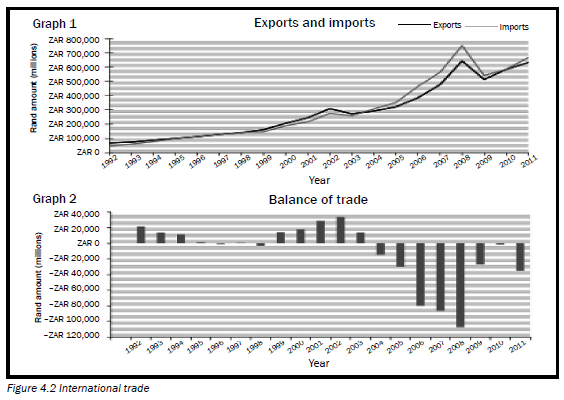ElimuZA Access to Education
THE FOREIGN EXCHANGE MARKET AND THE BALANCE OF PAYMENT ACCOUNTS QUESTIONS AND ANSWERS
Share via Whatsapp Join our WhatsApp Group Join our Telegram GroupActivity 1
Study Figure 4.2 concerning international trade and answer the questions that follow. Figure 4.2 International trade
Figure 4.2 International trade
- What does graph 1 depict? Supply a reason for your answer. (2)
- Define the term balance of trade. (3)
- Does the balance of trade in 2008 indicate a positive or a negative balance? (2)
- Estimate the balance of trade for 2008. (4)
- What effect did the closing of textile factories in South Africa have on the balance of trade? (3)
- Which economic trend in 2009 contributed to the decline in imports and exports? (2)
[16]
Answers to activity 1
|
Activity 2
Study Table 4.2 which shows the balance of payments extract and answer the questions that follow:
| BALANCE OF PAYMENT – ANNUAL FIGURES – R millions | 2009 | 2011 |
| Balance of current account | –97 062 | –98 785 |
| Capital transfer account (net receipts) | 216 | 241 |
| Financial Account: | ||
| Direct investment (net) | 35 708 | B |
| Portfolio investment (net) | 93 764 | –16 345 |
| Other investment (net) | –16 253 | 29 561 |
| Balance on financial account | A | 45 889 |
| Unrecorded transactions | 664 | 85 359 |
| Change in gross gold and other foreign reserves | –24 289 | 107 194 |
Table 4.2 Balance of payments for 2009–2011
- Define the concept balance of payments. (2)
- Calculate the missing figures in A and B. (4)
- What does ‘net figures’ indicate in the financial account? (2)
- Give TWO examples of income receipts earned by South African residents. (4)
- Briefly explain how balance of payments disequilibria can be corrected. (6)
[18]
Answers to activity 2
|
Published in Economics Grade 12 Study Guides and Notes